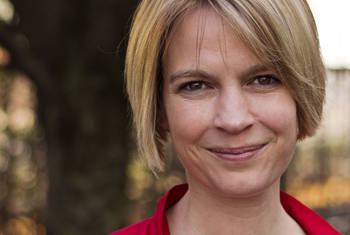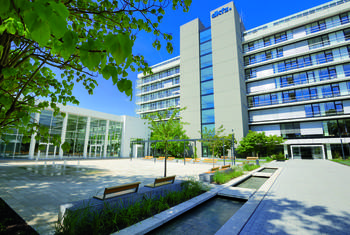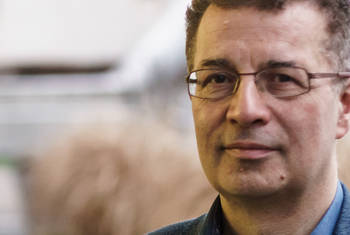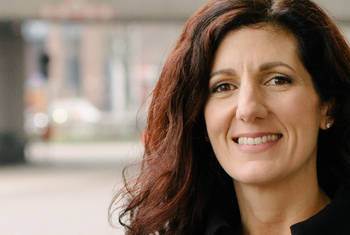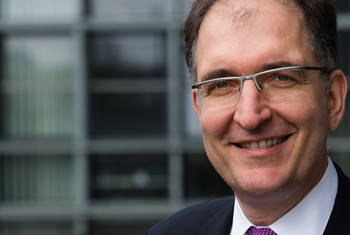Angelika Riemer Which Antigenic Determinants Can Be Used for Therapeutic Vaccinations Against HPV-Mediated Cancer?
Angelika Riemer is the Head of the research group “Molecular Vaccine Design” at the German Center for Infection Research (DZIF) and of the junior research group “Immunotherapy and -prevention” at the German Cancer Research Center (DKFZ), both in Heidelberg, Germany. After finishing her habilitation with the highest academic honors at the University of Vienna (Austria), she was a postdoctoral research fellow at the Cancer Vaccine Center at the Harvard Medical School in Boston, USA. Her major research interests include epitope-specific cancer vaccines and HPV-mediated cancers. She has received multiple prizes for her work, including the Ingrid zu Solms Science Award for Medicine, and was elected into the Young Academy of Sciences of Germany.
Area of Research
Epitope-Specific Cancer Vaccines, Mass Spectrometry-Based Identification of Low-Abundant Immunogenic Epitopes on the Surface of Cancer and Infected Cells, Development of a Therapeutic Vaccine Against Human Papillomavirus Infections and HPV-Mediated Cancers
since 2015
Research Group Leader “Molecular Vaccine Design”
German Center for Infection Research (DZIF)
since 2010
Junior Research Group Leader “Immunotherapy and -prevention“
German Cancer Research Center (DKFZ) (more details)
2008-2009
Postdoctoral Research Fellow
Cancer Vaccine Center, Harvard Medical School / Dana-Farber Cancer Institute, Boston, USA
2014
Board-Certified Medical Specialist for Dermatology and Venerology
2010
Board-Certified Medical Specialist for Immunology
2007
Habilitation in Immunology
Medical University of Vienna (Medizinische Universität Wien)
2005
PhD in Molecular Biology
University of Vienna (Universität Wien)
2002
MD (Dr. med. univ.)
University of Vienna (Universität Wien)
- Cancer Immunology, Immunotherapy
- Clinical Cancer Research
- Cytokine
- European Journal of Immunology
- Frontiers in Immunology
- Frontiers of Oncology
- Immunology
- International Journal of Cancer
- Journal of Immunology
- Journal of Immunological Methods
- Journal of Molecular Medicine
- Journal of Virological Methods
- Journal of Visualized Experiments
- Molecular Immunology
- Oncotarget
- PLoS ONE
- PLoS Pathogens
- Grant Reviewing for the Austrian Academy of Sciences
- American Association of Cancer Research (AACR)
- Austrian Society for Allergology and Immunology (ÖGAI)
- Association for Cancer Immunotherapy (CIMT)
- German Society for Immunology (DGfI)
- European Association of Allergology and Clinical Immunology (EAACI)
Prizes
- Ingrid zu Solms Science Award for Medicine (2015)
- 3rd of the top-100 Citizens of Salzburg (2010)
- Bronze Medal, Korea International Women’s Invention Exposition (2010)
- Prize of Advancement, Fund of the City of Vienna for Innovative Interdisciplinary Cancer Research (2008,2007,2005,2004)
- Univ.-Prof. DDr. Karl Fellinger-Award of the Austrian Cancer Aid for Outstanding Achievements in Cancer Research (2006)
- International Award for Research and Science, City of Salzburg (2006)
- Award of the Sanofi-Aventis Funds for Medical Research (2006)
- Merit Award, American Society of Clinical Oncology (2005)
- Wolfgang Denk - Award, Austrian Society for Hematology and Oncology (2005)
- Award of Distinction, Austrian Federal Ministry of Education, Science and Culture (2005, 2002)
- Scholar in Training Award, American Association of Cancer Research (2005, 2003)
- AstraZeneca Scholar Award, San Antonio Breast Cancer Symposium (2003)
- First Prize for Doctoral Thesis, Austrian Society for Dermatology (2002)
- Prize for Excellency in the Medical Course, Austrian Medical Association (2002)
Fellowships
- Fellow of Die Junge Akademie (2012)
 © Tobias Schwerdt
© Tobias Schwerdt

German Cancer Research Center (DKFZ)
The German Cancer Research Center (Deutsches Krebsforschungszentrum, DKFZ) with its more than 3,000 employees is the largest biomedical research institute in Germany. At DKFZ, more than 1,000 scientists investigate how cancer develops, identify cancer risk factors and endeavor to find new strategies to prevent people from getting cancer. They develop novel approaches to make tumor diagnosis more precise and treatment of cancer patients more successful. The staff of the Cancer Information Service (KID) offers information about the widespread disease of cancer for patients, their families, and the general public. Jointly with Heidelberg University Hospital, DKFZ has established the National Center for Tumor Diseases (NCT) Heidelberg, where promising approaches from cancer research are translated into the clinic. In the German Consortium for Translational Cancer Research (DKTK), one of six German Centers for Health Research, DKFZ maintains translational centers at seven university partnering sites. Combining excellent university hospitals with high-profile research at a Helmholtz Center is an important contribution to improving the chances of cancer patients. DKFZ is a member of the Helmholtz Association of National Research Centers, with ninety percent of its funding coming from the German Federal Ministry of Education and Research and the remaining ten percent from the State of Baden-Württemberg. (Source: Deutsches Krebsforschungszentrum)
Map
The research presented in this interview pursues the goal of developing a therapeutic vaccine against cancer induced by human papillomavirus (HPV). As ANGELIKA RIEMER explains, the project identified T helper epitopes to enhance existing vaccines and led to the identification of five valuable candidates for inclusion into a therapeutic HPV vaccine. This was accomplished via a computer-based analysis of already existing knowledge on epitopes (structures recognized by the body’s immune system to eliminate pathogens or infected cells), followed by in-vitro tests of the epitopes in blood of healthy and sick donors.
LT Video Publication DOI: https://doi.org/10.21036/LTPUB10060
Identification of Promiscuous HPV16-Derived T Helper Cell Epitopes for Therapeutic HPV Vaccine Design
- Agnieszka K. Grabowska, Andreas M. Kaufmann and Angelika B. Riemer
- International Journal of Cancer
- Published in 2015


